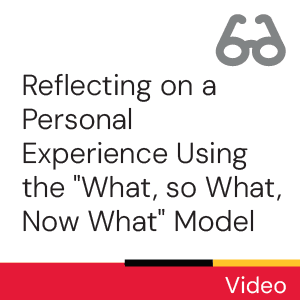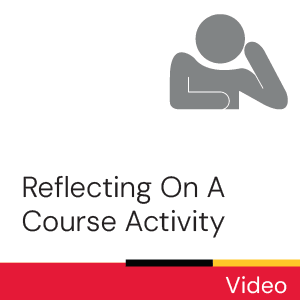Time commitment
2 - 5 minutes
Description
This video will introduce you to what critical reflection entails, and how to critically reflect using the "what, so what, now what" model.
Video
Transcript
What is a critical reflection?
In a critical reflection, you explain how events, experiences, or new knowledge have led to your personal growth.
A critical reflection is NOT simply a summary of what happened or a report of how you felt during an experience.
For a reflection to be critical, you must look closely at your beliefs and actions during an experience and explain how you think or act differently as a result of that experience.
Your reflection doesn’t have to be about a positive or successful experience. We often learn the most when things don’t go right.
The key is to choose an experience in which you learned something important that has challenged your beliefs or actions in some way. Chances are, the more challenging the experience, the more you’ll have to talk about.
If you have been asked to relate your experience to specific course concepts, make sure you choose an experience that you can directly relate to using terminology and ideas from the course.
Before deciding on an experience, you might find it helpful to write a brief point-form outline of the experience and note connections to course content and the assignment requirements.
Now let’s talk about how to structure your critical reflection using a three-stage model known as “What, So what, Now what.” Each stage represents one part of the reflection process.
Stage 1: What. What happened in a particular situation? Replay the event in your mind as though it were happening in front of you on a movie screen. What do you see? Be as objective as possible—try not to attach any judgements at this stage.
Stage 2: So what. Analyze the experience more deeply. What was important about this situation for you? How does this experience connect to course concepts? What did you learn?
Stage 3: Now what? This stage is about applying what you’ve learned. How have you changed or grown because of this experience? How will you think or act differently in future situations because of this experience? What are you going to do next?
You might try expanding your outline, dividing it into the three stages and taking notes about what you might include for each stage, What, So What, and Now What.
Remember: Whatever you are reflecting about, be as specific as possible in your examples and explanations. Help us understand what you experienced and how those experiences are connected to your learning and growth.
For more advice, examples, and templates for writing reflection papers, visit writeonline.ca
License

This work is licensed under a Creative Commons Attribution-NonCommercial-ShareAlike 4.0 International License.

